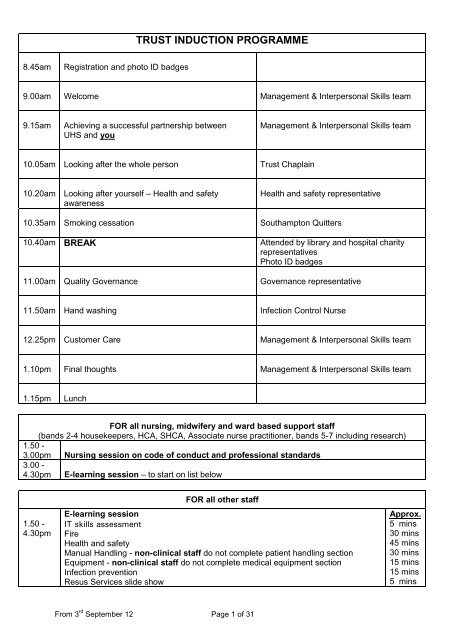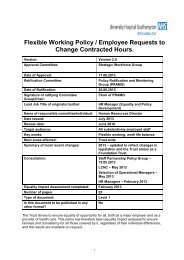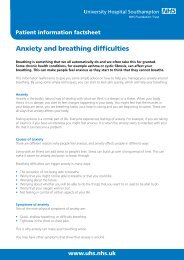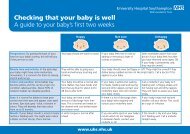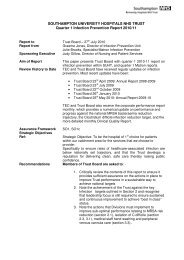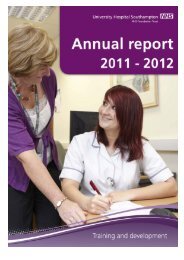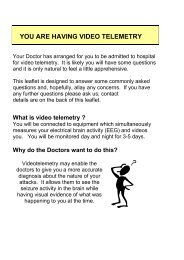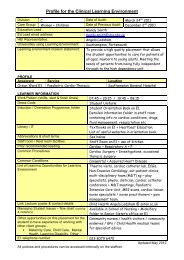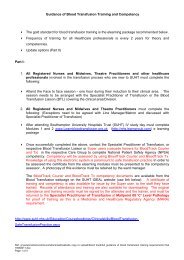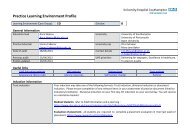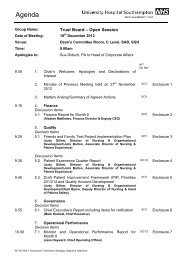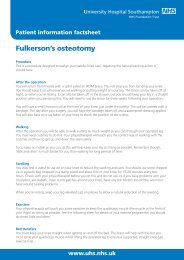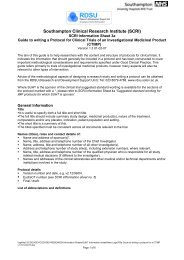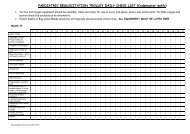Trust induction booklet - University Hospital Southampton NHS ...
Trust induction booklet - University Hospital Southampton NHS ...
Trust induction booklet - University Hospital Southampton NHS ...
Create successful ePaper yourself
Turn your PDF publications into a flip-book with our unique Google optimized e-Paper software.
Individual Learning Log for Statutory and Mandatory TrainingTraining Required Date EvidenceCustomer careEquipment trainingGovernance including complaintshandling & incident reportingFire safetyHealth and safetyHand hygieneHazardous substancesInfection prevention and PPEMoving and handling theorySlips, trips & fallsCompleted via <strong>Trust</strong> Induction daypresentationShould be completed via <strong>Trust</strong>Induction day e-learningCompleted via <strong>Trust</strong> Induction daypresentationShould be completed via <strong>Trust</strong>Induction day e-learningShould be completed via <strong>Trust</strong>Induction day e-learningCompleted via <strong>Trust</strong> Induction daypresentationShould be completed via <strong>Trust</strong>Induction day e-learningShould be completed via <strong>Trust</strong>Induction day e-learningShould be completed via <strong>Trust</strong>Induction day e-learningShould be completed via <strong>Trust</strong>Induction day e-learningBlood transfusionStat and mand training to complete as part of LOCAL <strong>induction</strong>Child protectionConflict resolutionEquality and diversityInformation GovernanceMedical devicesMental capacityResus basicSafeguarding adultsVenous Thrombo EmbolismThis learning log must be used as part of the Appraisal Process and must bepresented at meetings with your appraiser.From 3 rd September 12 Page 6 of 31
USEFUL NUMBERS AND CONTACTSOperator 100 Bleep operator 1010Cardiac Arrest and otheremergencies2222 Dial a bleep 15Fire 2222 Health and Safety 8484<strong>Hospital</strong> Chaplain(Secretary)8517 Occupational Health 4156Outside line 9 H.R. Department 6304Security Control Room 4122 Security Emergency 3333Travelwise 4133 Uniform queries 6278Uniform room 4463 British Medical Association 01962 856760RCN Representative07669177436UNISON Office 6870Your extensionYour manager’s extension<strong>Trust</strong> Strategy 2020 Vision:“Our goal is to be the country’s leading centre of clinical and academicachievement within ten years and to establish a world-class reputationby 2020. We will constantly improve patient care and foster innovationin an organisation that exceeds the expectations of patients and meetsthe needs of its purchasers and providers… We will offer a moreattractive place to work, learn and research than any of our competitorsand be rated by our customers as consistently excellent in everything wedo.”Strategic Objectives:• Delivering for tax payers• <strong>Trust</strong>ed on quality• Excellence in health care<strong>Trust</strong> values:• Patients first• Working together• Fresh thinkingFrom 3 rd September 12 Page 7 of 31
From 3 rd September 12 Page 8 of 31
From 3 rd September 12 Page 9 of 31
Quitters - Smoking Cessation TrainingFacilitator(s) Lisa Hodges & Hazel AgombarTarget AudienceThis session is for all staff working with patients at <strong>University</strong> <strong>Hospital</strong> <strong>Southampton</strong>.Learning outcomesTo enable you to confidently raise the issue of smoking status with your patients, toidentify and support smokers who are motivated to quit, to know how to refer to<strong>Southampton</strong> Quitters and to briefly explain what patients can expect from<strong>Southampton</strong> Quitters.Programme detailsThis course provides you with the knowledge and skills to raise the issue of smokingwith your patients, support those who are motivated to quit and to understand how torefer to the local stop smoking service, <strong>Southampton</strong> Quitters.It highlights the importance of smoking cessation as the most cost effective clinicalintervention which produces better health outcomes for patients and saves <strong>NHS</strong>resources.The session will explain what your patients can expect from Quitters and outline thestop-smoking medications that are available.**************** FREE Refreshments at this session *****************‘Stop Smoking’ Drop-In for all staff membersEvery Wednesday 11am – 1pmThe Spice of Life (B Level)For more information call 023 8051 5221 or just drop in!From 3 rd September 12 Page 13 of 31
UHS communications teamThe communications team is part of <strong>Trust</strong> HQ and deals with press enquiries,promotes the good work of the <strong>Trust</strong>, develops the <strong>Trust</strong>’s website and intranet,manages internal communications such as Connect and Core Brief, engages thehospital’s members, has responsibility for consultation and managing the <strong>Trust</strong>’scorporate identity.For full details seehttp://staffnet/Departments/<strong>Trust</strong>HQ/Communications/Communications.aspxWhat should you do if a member of the media contacts you?Please do not deal with their enquiry yourself.Ask them to contact the press officer on 023 8079 8756.Media calls outside normal office hours should be directed to the duty manager.We will only carry out condition checks if the reporter has the full name of theindividual patient concerned, and these requests must be referred to the pressofficer.Under no circumstances may interviews, filming or photography be carried out on oraround <strong>Trust</strong> sites without the prior permission of the communications team.A note about corporate identityThe Communications team has responsibility for managing the <strong>Trust</strong>’s corporateidentity, including use of the logo.For advice in the meantime email sarah.cole@uhs.nhs.uk or ring ext. 8773.Where can you find out more?To find out more about the communications team and all of the above ways wecommunicate with you, plus how you can share your news with us, see our pages onStaffnet http://staffnet/Departments/<strong>Trust</strong>HQ/Communications/Communications.aspxFrom 3 rd September 12 Page 14 of 31
UHS StructureDivision ADivision BDivision CDivision DHeadquarters• Surgery• Cancercare• Criticalcare &Theatres• EmergencyMedicine• SpecialistMedicine• Ophthalmology• Radiology• Pathology• Women &Newborn• Child health• Supportservices• ClinicalSupportincludingPharmacy,MedicalPhysics• Non-clinicalsupportincludingPortering,Security,Medirest,Patient andCateringServices• Cardiovascular& Thoracic• Neurosciences• Trauma &Orthopaedics• BereavementCare• Chaplaincy• Communications• Corporate Affairs• CostImprovement• Estates &CapitalDevelopment• Finance• Governance• HumanResources• Training anddevelopment• InformationManagement(IM&T)• Litigation &InsuranceServices• Patient SupportServices• Research &Development• StrategyFrom 3 rd September 12 Page 15 of 31
UHS <strong>Trust</strong> Board MembersJohn Trewby, ChairmanJoined the <strong>Trust</strong> in April 2008 as Chairman, appointed by <strong>Trust</strong> Board.Mark Hackett, Chief ExecutiveMark joined the <strong>Trust</strong> as Chief Executive on 2 August 2004.Jane Hayward, Chief Operating OfficerMichael Marsh, Medical DirectorJudy Gillow, Director of NursingAlastair Matthews, Director of Finance & Deputy CEOFrom 3 rd September 12 Page 16 of 31Members CouncilThe Members’ Council is the collective body through which executive and non-executive directorsexplain and justify their actions. It works closely with the <strong>Trust</strong> Board to make sure services aremeeting the needs of the local community.The Members’ Council consists of 23 members who will gather the views of the hospital's membersand give them a voice at the highest level of the organisation. These representatives have certainroles and responsibilities and must carry out statutory duties.All staff within the <strong>Trust</strong> are automatically members of the hospital and belong to a constituencyunless they opt out.Public Elected Council Members13 from <strong>Southampton</strong> City, New Forest, Eastleigh and TestValley, Isle of Wight and Rest of EnglandStaff Elected Council Members4 from Medical & Dental, Nursing & Midwifery, Other Clinical and Non-Clinical SupportAppointed Members6 from local stakeholders including the Council, PCTs, <strong>University</strong> and local businessMembers’ Council Meetings• Full Members’ Council Meetings held every three months• Sub-groups on:o patient experienceo staff experienceo strategy
o membership and engagement strategy• For meeting dates see Website or contact Head of Corporate Affairs on 023 8079 6829• If you have any issues to raise please contact your Council MemberFull Members’ Council meetings are held every three months, and all the meetings are open to thepublic – including staff.Who are your Council Members?Medical and dental - Brian BirchNursing and midwifery - Pat KemishOther clinical staff - Kieran HandNon-clinical and support staff - Gordon KemishEach Council Member is willing to help staff with any issues that affect the way that the hospitalworks as a foundation trust. They can be contacted through Staffnet and Outlook.All staff Council Members sit on the Staff Experience Group. Elections for the Nursing and Midwiferyand Non-Clinical and Support Council Members will be held in the summer of 2013 and we hope thatthose constituent members will put themselves forward for election and participate in the voting.Elections for the Medical and Dental and Other Clinical Council Members will be held in 2014.From 3 rd September 12 Page 17 of 31
Welcome to UHSJoint Staff Side CommitteeHealth workers working togetherAt UHS we have an active staff side who are committed to true Partnership working and aim to keepour members informed about what is happening within the <strong>Trust</strong> and the <strong>NHS</strong>.Our monthly meetings are well attended by nominated representatives of all unions, and a bi-monthlymeeting with management at Staff partnership Forum ensures good communications.Please consider joining a union and supporting staff side. All of the unions listed below haveaccredited representatives in UHS;• BAOT (British Association of Occupational Therapists)• BDA (British Dental Association)• BIOS (The Association of Biochemists)• BMA (British Medical Association)• BOS (British Orthoptic Society)• CDNA (The Community and District Nursing Association)• CSP (Chartered Society of Physiotherapy)• FCS (Federation of Clinical Scientists)• GMB• HPA (<strong>Hospital</strong> Physicist’s Association)• RCM (The Royal College of Midwives)• RCN (The Royal College of Nursing)• SoCP (The Society of Chiropodists and Podiatrists• SoR (The Society of Radiographers)• UCATT (Union of Construction, Allied Trades & Technicians)• Unison• UNITE• USDAW (The Union of Shop, Allied and Distributive Workers)To speak to a union representative about joining or for other information please contact theTrade Union Office on ext 6870, mail point 404, SGH.You could also become a Union Learning Rep (ULR) if you are interested in helping yourcolleagues learn new skills and feel you would like to make a difference by encouraging otherworkmates into learning. If you are interested please contact the Trade Union Office on ext6870, mail point 404, SGH.From 3 rd September 12 Page 18 of 31
Some HR Policies you should be aware of•Alcohol & Drugs•Appearance•Business Conduct•Complaints•Data protection•Development Reviews (appraisals)•Eliminating Bullying and Harassment•Disciplinary Rules•Education and Learning•Flexible Working•Fire Safety•Fraud•Gateways policy for Development Reviews (appraisals)•Grievances and Disputes•Health & Safety•Managing Attendance•Maternity Leave and Pay•Pay and Employment Conditions Protection of•Raising Concerns - Whistle blowing•Retirement•Single Equality Scheme•Smoke Free Site•Staff Induction•Special Leave•<strong>Trust</strong> Travel•Violence & Aggression PreventionPolicies are available on Staffnet under Working Here and HR Policies.From 3 rd September 12 Page 19 of 31
<strong>Trust</strong> Phone CardsPhone cards are the ONLY way of making personal telephone calls or sending personal faxes fromthe hospital telephones. All staff should have one as you never know when you may need to use thetelephone – even if you have a mobile your battery may be flat or you may not wish to pay the high callcharges. Judging by the amount of outgoing calls to banks, catalogue companies, theatres and travelcompanies we all need one!These phone cards can be used from any phone with the hospital or outside as well!Phone cards are simple to use – ho hidden charges – no bills – no VAT – no forms to fill in – a £5.00card buys £5.00 worth of calls – what you pay is what you get!The phone cards can be topped up using major credit cards and can be used by staff, relatives andvisitors.The phone cards are available from switchboard in core hours only and at the RSH cashiersoffice.<strong>Trust</strong> volunteer interpreting serviceVoluntary services are also looking for more members of staff to sign up as interpreters and areparticularly keen to hear from Polish and Portuguese speakers. The <strong>University</strong> of <strong>Southampton</strong> runsa 12-week course at the General <strong>Hospital</strong>, for anyone wishing to become a volunteer interpreter.Regular courses are heldFor an information pack on volunteer interpreters, please contact Kim Sutton on 4688 or emailkim.sutton@uhs.nhs.ukStaff should only book a paid service if there is no appropriate interpreter available, and they mustobtain authorisation from a senior manager. The first choice paid service is Access toCommunication, followed by Language Line and finally Lingland Interpreters if the others are unableto help.Please also be aware that only trained interpreters should be used. In the interests of accuracy,accountability and confidentiality, family members and friends should not be used as interpreters.From 3 rd September 12 Page 20 of 31
Confidentiality & Data ProtectionStaff Code of ConductInformation for All StaffEveryone working for the <strong>NHS</strong> has a legal duty to keep information about patients and clients confidential andto protect the privacy of information about individuals.In the course of your work you will be called on to handle and see person-identifiable information whether it bestored on paper or on computer. You are responsible for safeguarding the confidentiality of all personal and<strong>Trust</strong> information, transmitted or recorded by any means. You must not discuss or disclose such informationexcept to authorised personnel.If you are found to have made an unauthorised disclosure of personal information it is a disciplinary offence,you could also face prosecution. If you are in doubt as to which disclosures are unauthorised, check with yourmanager.This leaflet is designed to help you understand the regulations and your responsibilities to maintainconfidentiality.All StaffAll staff should be aware of the principles outlined in the Data Protection Act 1998 and the requirementsplaced on them by the common law ‘duty of confidence’ impact on their work.If you belong to a professional group e.g. nurse, doctor, physiotherapist, you are subject to the confidentialityclauses of your professional Code of Conduct. You should ensure that you are familiar with the specificresponsibilities of your professional code.Personal DataPersonal data is any information which can be used to identify a living person or facts about them, includingopinions or intentions towards them.Data Protection Act 1998The Data Protection Act has eight Data Protection Principles, which cover the use of "personal data". The DataProtection Act sets standards, which must be satisfied when obtaining, recording, holding, using or disposingof personal data.Personal data must be:1. Processed fairly and lawfully2. Processed for specified purposes only3. Adequate, relevant and not excessive4. Accurate and up-to-date5. Not kept for longer than necessary6. Processed in accordance with the rights of data subjects7. Protected by appropriate security8. Not transferred outside the European Economic AreaConsent to Use Personal DataPatients have generally consented for their personal information to be used in connection with the provision ofdirect healthcare. Use or disclosure of patient information for other purposes such as research or educationcannot be assumed and individual consent should normally be sought from the patient to use personalinformation for non direct care purposes.If a patient wishes to restrict the disclosure of their personal information in any way their wishes should berespected.If in doubt about using personal information in any way, please consult the Data Protection office for advice.From 3 rd September 12 Page 21 of 31
Disclosure of Personal DataUnauthorised disclosure of personal data constitutes a serious breach of discipline and could lead todismissal. Staff should ensure personal information is only disclosed for legitimate purposes and to thoseauthorised to receive it. Particular care should be exercised when disclosing personal data on the telephoneor considering the release of personal data to a third party outside the <strong>NHS</strong>.Keeping Personal Data SecurePersonal data should be kept secure at all times. All staff have duty to ensure any personal information theyhold on paper or digital form is protected from loss or accidental disclosure at all times.When transferring personal data by any means <strong>Trust</strong> guidelines on secure communications should befollowed. The use of <strong>NHS</strong> mail as a means of securely sending personal data within the <strong>NHS</strong> isrecommended.Subject Access to Personal DataIndividuals have a right under the Data Protection Act 1998 to view or obtain copies of information held aboutthem by organisations. Patients inquiring about their right of ‘subject access’ should be advised to contact theHealth Record Information Team, Patient Advice and Liaison Service (PALS) or consult the <strong>Trust</strong> publicwebsite for information and advice. <strong>Trust</strong> staff should apply to the Human Resources department in respect ofpersonal information held by the <strong>Trust</strong> about them.Health Records Information Team: 02380 748005 or 02380 794885<strong>Trust</strong> PALS: 02380 798498<strong>Trust</strong> Public Website:www.uhs.nhs.ukBreaches of ConfidentialityIf you think that a breach of confidentiality has taken place please report it as a non-clinical incident using the<strong>Trust</strong> incident management reporting mechanism.CaldicottThe <strong>Trust</strong> is required to have a Caldicott Guardian to safeguard and govern the uses made of confidentialpatient information.The <strong>Trust</strong> Caldicott Guardian is:Director of Nursing and Patient ServicesRemember• You have a legal duty to keep any personal data you handle secure at all times and to ensure it is notreleased without appropriate consent• The use of personal data for purposes other than direct care may need specific consent from the patient• Health Records belong to the Secretary of State and the <strong>Trust</strong>. It is a disciplinary offence to access yourown, family or others records• There are monitoring facilities in place that can identify individuals who access information on the <strong>Trust</strong>systems inappropriately• To follow the guidance contained in the <strong>Trust</strong> Confidentiality and Data Protection Policy and keep up todate by completing the training offered as part of the <strong>Trust</strong> Mandatory Training programme.If you have any queries on confidentiality or Data Protection issues please contact:The Data Protection Office: Extn 5079From 3 rd September 12 Page 22 of 31
Hampshire and Isle of Wight Counter Fraud ServiceFraud: recognise it, report it and stop it!It is important that everyone working in the <strong>Trust</strong> understands the risks of fraud and what the <strong>Trust</strong> isdoing to tackle the problem. The cost of fraud to the UK is currently estimated at £73 billion per year ofwhich losses to the <strong>NHS</strong> are thought to be at least £3 billion. Whatever the true figure, it is not avictimless crime; your taxes help to fund the <strong>Trust</strong>, as an employee your department’s budget could beaffected and it could mean fewer resources for patient care.When are someone’s actions fraudulent?A person must be behaving / have behaved dishonestly with the intention to make a gain or to cause aloss by lying about something. It doesn’t matter whether the lie is verbal or written down.The person committing fraud doesn’t have to be successful so long as the intent exists.What is the <strong>Trust</strong> doing to tackle fraud?The <strong>Trust</strong> has appointed a Local Counter Fraud Specialist who undertakes a range of duties tominimise the impact of fraud on the organisation. This includes work to make it difficult to commit fraud,efforts to deter fraudsters and investigating concerns when they are raised. The <strong>Trust</strong> actively promotesan ‘anti fraud culture’ by creating an environment where it is safe to raise genuine concerns and wherewe all work together to send a clear message that fraud will not be tolerated.Test your knowledge (answers overleaf):What should you do if you have a concern?1. Confront the suspect2. Wait and see what happens3. Contact the Local Counter Fraud Specialist4. Tell a colleague or managerHow much information do you need before you raise a concern?1. One piece2. A reasonable suspicion3. No information4. A ‘gut feeling’From 3 rd September 12 Page 23 of 31
Answers:If you have a concern, contact the LCFS immediately.The LCFS will determine who else should be informed e.g. Human Resources. Please don’t confrontsomeone, it may put you at risk and could jeopardise an investigation. Waiting to see what happenscould allow fraud to become worse. By telling a colleague or a manager risks giving someone else whomay be involved an opportunity to disguise their actions. Collusion is rare, but it does happen.You can raise a concern if you have a reasonable suspicion.The <strong>Trust</strong> is legally obliged to support a person’s right to raise a concern where it is genuinely founded.(The <strong>Trust</strong> will always take appropriate measures to protect people from malicious allegations).What types of offence have been investigated at the <strong>Trust</strong>?• People claiming payment for work they haven’t done• Employees taking time off work due to sickness but working elsewhere• Patients forging prescriptions• Job applicants lying about qualifications or experience• Contractors submitting invoices for work which wasn’t undertakenWho should I speak to if I have concerns?You should contact the Local Counter Fraud Specialist (LCFS) who is Jennison Baskerville.Jennison can be contact on:07881 954851 (mobile)01962 876668 (landline)jennison.baskerville@hampshire.nhs.ukNeed further information?Read the quarterly “Fraud Matters” newsletter on the Staffnet (search for ‘fraud’)Visit a drop-in session on the next education rolling half day(select the Staffnet front page dropdown menu item ‘your development’)Visit the fraud team’s website www.hampshire.nhs.uk/fraudRemember, fraud isn’t a victimless crime; by being aware and referring any concerns you canhelp to make a real difference and protect the <strong>Trust</strong>.From 3 rd September 12 Page 24 of 31
Waste Disposal InformationTotal cost is £100,000 on Domestic disposal & £600,000 on Clinical = £700,000This <strong>Trust</strong> produces approximately 1200 tonnes of clinical waste and 1400 tonnes of domesticwaste each year.Disposal costsClinical waste is separated into:clinical sharps/ medicinal glass bottle waste @ £612/tonne andclinical waste as in yellow clinical waste bags @ £419/tonneDomestic waste £98 tonneUHS spends £700k on waste (clinical and domestic combined). If we could reduce the amount ofclinical waste by segregating properly and not contaminating this waste stream with inappropriatewaste such as cardboard, paper, plastic or recyclables or domestic waste, it would be a huge savingto the <strong>Trust</strong> and more environmentally friendly.Currently we are negotiating with our local Council to have our recyclable glass taken away for FREEand recycled and used under road surfaces. If this were not sent for recycling it would go into thecostly clinical waste stream at £612/tonne, so your glass bottles would be gratefully received!Currently the <strong>Trust</strong> has two waste streams for cardboard recycling; larger cardboard items arecollected and flattened by the ward areas, placed in a green cage and sent to the waste managementarea. Here is it bailed and sent to a company for recycling. We currently receive a rebate of£30/tonne via this recycling avenue.Waste SegregationSegregation of waste is essential to ensure that all waste is disposed of correctly and safely and inthe most cost effective way. For example a clinical waste bag filled with domestic waste will becharged as clinical waste. Research shows that 40-50% of waste found in clinical bags is domesticwaste. Please think of the cost difference.Clinical WasteEnsure everything clinical goes into a yellow bag. This includes any items that have been in contactwith body fluids such as dressings, gloves, aprons and sanitary towels.SharpsSharps must be placed in the yellow sharps bin with a secure lid - Never put needles/sharps in ayellow bag. This is important to reduce injury and cross infection to staff.Domestic WasteAll other non-clinical waste that cannot be recycled including packaging, food waste, paper towels etcmust be placed into the black domestic waste bags.From 3 rd September 12 Page 25 of 31
Other WasteMixed recycling bins will take: plastic bottles, cans, tins, milk cartons, packaging from clinical areas.This has helped segregate from domestic waste and inadvertent clinical waste. Recycle as you wouldat home but please remember NO FOOD or containers with food debris on them. Please rinse cansor cartons such as soup cans or milk cartons, Crush milk containers and remove the lids. The lids donot recycle in this area nor yoghurt pots due to polymer content and high cost of recycling such items.Office papers – put in a blue paper recycling paper bin and inform waste when full and it will becollected and then recycled.Confidential waste - must be double bagged in black bags and marked confidential and the Wasteteam will collect. They have a regular pick up day for every area.Put crushed cardboard in cardboard bin in your area. This will be collected, bailed on site sent to acompany for recycling. For small cardboard items such as glove boxes, medicine packets pleasecrush and put in orange mixed recycling bin if you can't get to large green cage.Glass can be recycled. Put your rinsed glass in a thick brown sack marked 'Glass for Recycling' andplace by Domestic bin in Kitchen areas or sluice. Please ensure it is only glass and not china or othercontaminants in the bag. Call Waste Management ext 4490 when the bag is half full. It may be heavyif overfilled. For broken china or other items use a brown sack and label accordingly.Used batteries - preferably use a smallish box lined with a plastic bag. If a large box is used this maycause a health and safety issue regarding weight. Waste will collect if you give them a call. They aresent to Europe by a company, dismantled and recycled.Furniture - the waste team will collect within 1 week and recycle. (Please ensure that a label is put onfurniture for disposal, saying for disposal otherwise it will not be taken and leave in a safe place not ina main corridor)Ink and toner cartridges - the Waste team will also collect these as they are sent to stores andrecycled.Computers - need to be reported to the IT department so that they can decide whether they can bere-used or disposed of.If you need any further information or resources contact Andrew Hatcherext 4490 bleep 9209 or via outlook.If your bins are full please phone ext 4490 /bleep 9216 for waste collection.From 3 rd September 12 Page 26 of 31
Energy Efficiency at UHS<strong>University</strong> <strong>Hospital</strong> <strong>Southampton</strong> employs 9000+ staff with an energy and water bill of £6.13million therefore a small change in the way we use energy could make substantial cost andcarbon emission reductions.Taking a few simple actions by all of us could make substantial savings, in the region ofhundreds of thousands of pounds. Remember the saying “every little bit helps”Energy efficiency is a large if not the largest weapon against climate change.British Government Carbon reduction targets (Climate Change Act 2008)80% reduction in greenhouse gas emission from 1990 levels by 205034% reduction in green house gas emissions from 1990 levels by 2020<strong>NHS</strong> Carbon reduction Targets10% reduction in Greenhouse gas emissions from 2007/2008 by 2015/16Hefty financial penalties exist should we fail to meet these targets.How can we reduce CO2 emissions/energy?Lighting• Switch off lights that are not needed• Make maximum use of daylight• Don’t leave lights on in unoccupied areasLighting an office overnight wastes enough energy to make 1000 cups of tea!!The trust has converted 95% of its lighting to low energy lights saving 70% of theused.electricityComputers and office Equipment• There are around 4500 PCs and 500 laptops in the SGH which use approximately £225,000worth of electricity per year.• 66% of the power consumed by a computer is in the screen.Always switch off the screen when leaving the computer and shut it down if you leave it for anylength of time. (Screen switch normally in the bottom right hand of the screen frame)• Ensure all laboratory and office equipment is switched off when not in use and particularly overthe week ends.• When photo copying use the double side option whenever possible to save paper.• Effective management of office equipment can reduce its energy consumption by up to 70%.A photocopier left on standby overnight wastes enough energy to make 30 cups of tea.The annual energy consumption of the lifts at UHS would power a housing estate of 300 housesfor a year. Use the stairs whenever possible which is good exercise also.Heating• A 1% rise in heating temperature increases the cost by 8%• Offices should be heated at about 18/19°C and wards 21/23°C.• Report any heating problems to ext 8321.• Air conditioning an office for 1 hour a day uses enough energy in a month to power a TVcontinuously for a year.Boiling water• When boiling water only boil amount required, no more no lessFrom 3 rd September 12 Page 27 of 31
MythsLeaving a water tank heater on continuously will save energy!!Smaller water heaters should be left on in busy periods however they should be switchedoff when not in use and after hours to save energy and money.FridgesKeeping at a lower temperature setting will save energy because it will not have to switch onand off so much.All fridges will use more electricity to achieve lower temperature settings. Fridges can safelystore food at around 5°CEquipment on StandbyWhen an appliance is left on standby—it is switched offElectrical products continue to consume power when on standby. and should be switched offat the mains.Energy saving Quiz1. What should you do if you feel too warm in winter in your office?a) Open windows b)Turn up air conditioning c)Turn heating down d)Tell your manager2. It is better to leave Fluorescent lights on all the time as they use a lot of energy whenstartingTrue False3. Climate change will give the UKs weather a warmer Mediterranean like climate!True False4. How much electricity generated in large power stations is lost before it reaches you?a) 20% b) 50% c) 65% d) 70%5. Putting an office printer in sleep mode when not in use and turning it off overnight willsave energy and carbon emissions.True False6. On average how many litres of water per day does each person use in the UK?a)80L b)100L c)120L d)140L7. What is the annual cost of energy and water at UHS?a)£4.12M b)£3.2M c)£6.13M d)£7.46M8. What is the Government target from a 1990 baseline for reducing carbon emissions thatare created by burning fossil fuels by 2050?a)20% b)60% c)70% d)80%AnswersQ1.c Q2.False Q3.False Q4.c Q5.True Q6.d Q7.c Q8.dFrom 3 rd September 12 Page 28 of 31
Medication SafetyAnnual Update2011-12IntroductionThis update is intended to highlight the priorities for education and training in medication safety for2011. The general information contained in this update will be useful for non-clinical staff who comeinto contact with medicines at any time. Being aware of the issues highlighted in the update will helpto prevent medication errors.All staff who encounter medicines in any way should read the update including:• Porters• Ward Clerks• Managers• Non-clinical StaffThe use of medicines in the trust is covered by the medicines policy which can be found on Staffnetunder “medicines”Medication ErrorsA medication error is any unintended or unexpected error which could have or did lead to harm fromthe use of a medicine.Safe and Secure MedicinesIt is vital that medicines are kept safe and secure at all times. This is to prevent the medicines gettinginto the wrong hands and potentially resulting in patients taking the wrong medicines. Somemedicines are extremely expensive and if they get lost time is wasted looking for them or they haveto be re-dispensed.Please remember;-• When delivering medicines make sure you inform a member of ward staff.• Hand controlled drugs and refrigerated items to a member of ward staff directly.• If you receive medicines make sure they are stored securely in the correct location.From 3 rd September 12 Page 29 of 31
MistakesThe most common problem reported are omitted and delayed doses due to drugs notbeing available on the ward. There are a few simple steps that everyone can do toavoid this.• When collecting charts to take to pharmacy make sure they have the correctward on them.• When transferring patients to a new ward make sure their medicines go withthem.Out of hours there is an emergency cupboard and the on-call pharmacist can becontacted for advice via switchboardControlled drugsControlled drugs (CDs) are drugs such as morphine and pethidine which, by law, mustbe accounted for. The trust has rigorous policies and procedures relating to CDs. Thepolicy is part of the medicines policy.• Orders for controlled drugs must be sent to the pharmacy by 11am onweekdays only.• Order books can be posted into the pharmacy on C level out of hours.• Records of all issues must be kept in your CD record book.• Any discrepancies must be investigated immediately and reported to your linemanager and on a trust incident form• CDs must not be transferred between wards and departmentsCurrent medication Safety WorkThere is much work occurring medcation safety in the trust if you want to find out moreabout specific subjects see the links below.Omitted and delayed doses -http://staffnet/MissedDosesDrug administration workbookhttp://staffnet/Governanceandquality/Patientsafety/Medicationsafety/Drugadministrationandmedicationsafetyworkbook.aspxInsulin –http://staffnet/Governanceandquality/Patientsafety/Medicationsafety/Insulinhelpandadvice.aspxMedication Safety Update 2011/12 produced as part of medication safety training.Medication safety teamFor more information contact Andy Fox – Medication Safety PharmacistFrom 3 rd September 12 Page 30 of 31
To access E-learning from homeGo to the <strong>Trust</strong>’s public website:http://www.uhs.nhs.uk/home.aspxClick on the Education link near to the top of the pageClick on Induction on the left hand side of the page.Click on the link to <strong>Trust</strong> Induction e-learningScroll down to the blue buttons near to the foot of the pageClick on the appropriate buttonTo access the Fire, Manual Handling, Equipment, Hazardous Substances andSlips, Trips and Falls training, click on the blue Login to <strong>Trust</strong> Induction E-learningbutton – a new window will open. Scroll down and click the grey button.On the next page, enter training as the Username and training as the Password,then click the Log-in to Induction Training buttonTo access E-learning from UHSGo to the Staffnet homepage and click on Education on the right hand side.In the new window, click on Induction on the left hand side of the page.Click on the link to <strong>Trust</strong> Induction e-learningScroll down to the blue buttons near to the foot of the pageClick on the appropriate buttonTo access the Fire, Manual Handling, Equipment, Hazardous Substances andSlips, Trips and Falls training, click on the blue Login to <strong>Trust</strong> Induction e-learningbutton – a new window will open. Scroll down and click the grey button.On the next page, enter training as the Username and training as the Password,then click the Log-in to Induction Training buttonE-learning roomsCyber Centre – B level, East wing next to Spice of Life restaurantLearning Support Training room – A level, south academic block in Learning SupportIM&T Training room 1 & 2 – in <strong>Trust</strong> Management offices entrance level 1 (Old nurseshome) by side of multi-storey car parkFrom 3 rd September 12 Page 31 of 31


